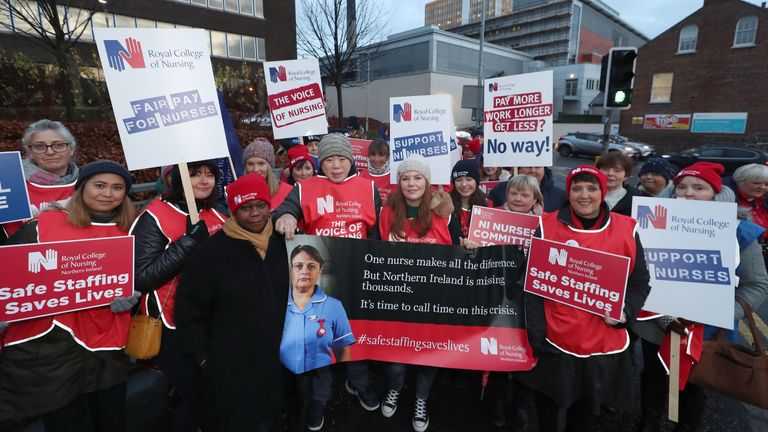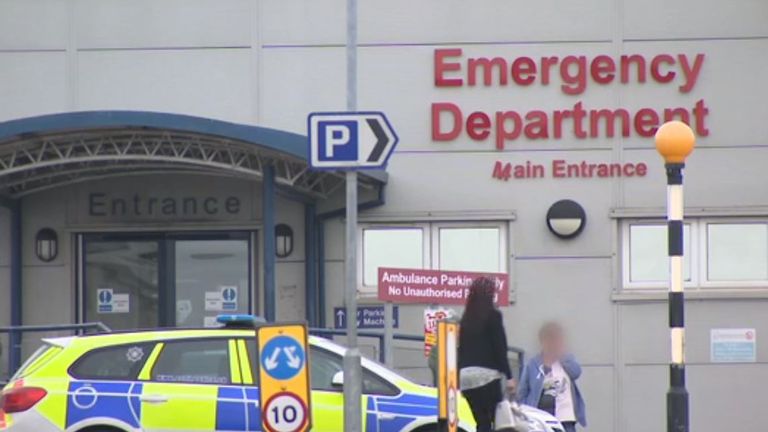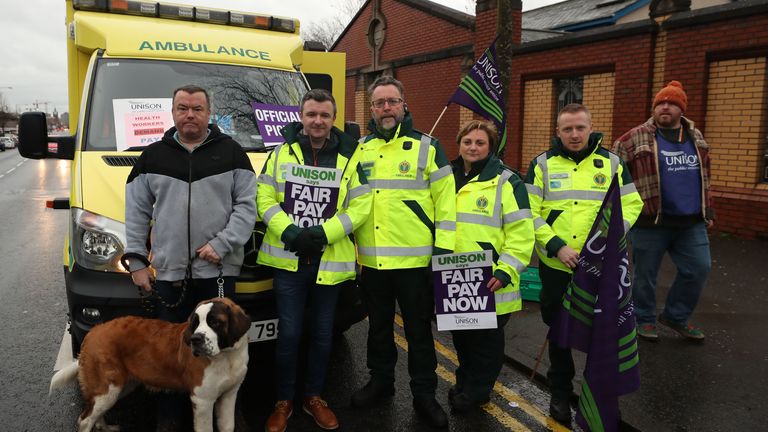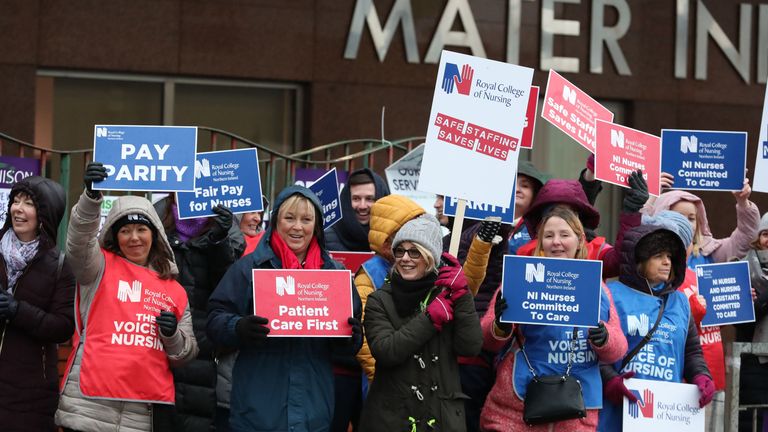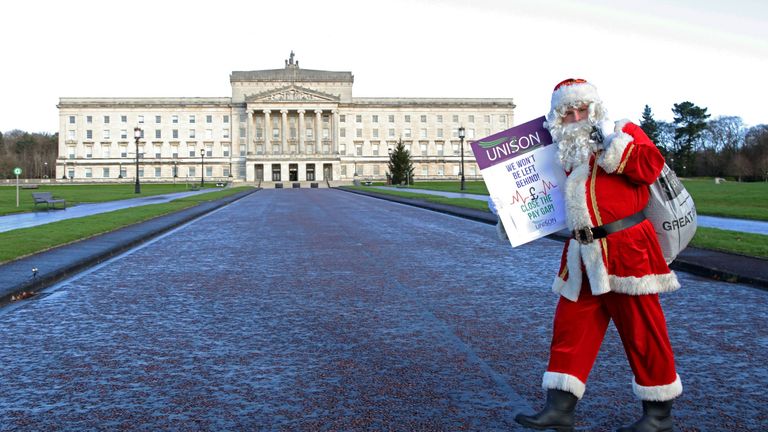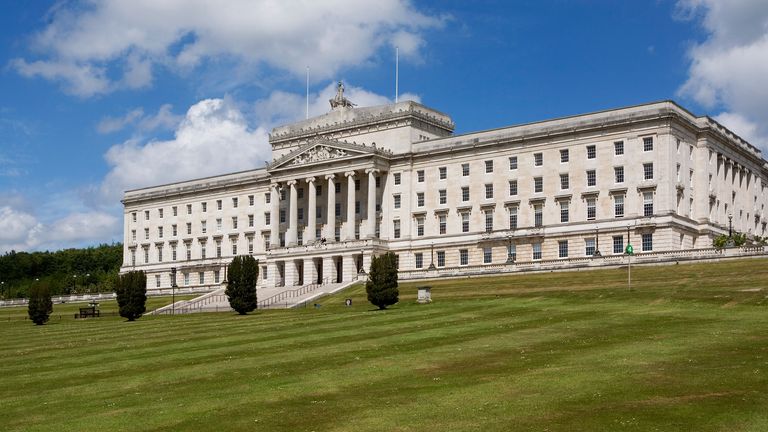Cancellations and closures as thousands of nurses walk out in UK first
Appointments are cancelled, hospital units closed and ambulances delayed because of the unprecedented strike in Northern Ireland.
Wednesday 18 December 2019 12:40, UK
Around 9,000 nurses in Northern Ireland are staging a walkout today - the first time ever that 12-hour strike action has been held in the UK.
Routine medical appointments will be cancelled, minor injury units closed and some ambulance responses delayed because of the unprecedented demonstration, sparked by a dispute over pay.
Nurses in Northern Ireland are paid less than their counterparts in England and Wales - by some £1,419 for a new nurse and as much as £4,677 for a specialist nurse.
There has been no sign of change because there are no ministers in place at the devolved parliament in Stormont.
The government collapsed in January 2017 and has been completely unproductive since then, meaning health authorities have been unable to break the deadlock with their increasingly disillusioned workers.
According to the Royal College Of Nursing (RCN), around half of nurses in Northern Ireland are considering leaving the profession because of pressure caused by under-staffing.
Dame Donna Kinnair, chief executive and general secretary of the RCN, said: "This is a moment every nurse wishes had never come, but faced with an abject failure to tackle unsafe staffing levels and severe pay inequality with colleagues from across the UK, our members in Northern Ireland are saying enough is enough."
:: Listen to the Daily podcast on Apple Podcasts, Google Podcasts, Spotify, Spreaker
Other workers who are covering for those on strike will place further strain on the health service in the country, with spending on temporary agency staff to fill gaps having doubled.
In addition to the nurses' strike, industrial action by the Unison, Unite and Nipsa trade unions means some ambulance paramedics and health workers in cleaning, catering and other fields will also walk out on Wednesday.
Andrew Tumilson, a deputy charge nurse at Ulster Hospital, said he hoped the politicians were listening.
"We are hoping this will make an impact in that our voices will be listened to," he said.
"The inadequate workforce planning which has happened in Northern Ireland over the last number of years has now come to stage where action is immediately required in order to not only restore pay parity, which will help in relation to retention of our current registered staff, but also help attract staff to come here and stay here and work."
Joanne Stephenson, another nurse at Ulster, added: "Staff didn't want to put patients at risk but actually they are aware patients are at risk already because of the staffing levels.
"People have got to the end of their tether; there's only so much good will. They are working overtime, they are not getting breaks, they are not getting a chance to do what they want to do and they are going home and there's tears, there's real tears about what staff want to be able to do but can't do."
While services like cancer care will be exempted, and all emergency departments will remain open, major disruption is still expected across a country where waiting lists are still significant.
According to Department of Health figures released last summer, nearly 300,000 people in Northern Ireland were on a waiting list for a first appointment with a consultant.
Minor injury units at South Tyrone, Mid Ulster, Bangor and Ards hospitals will all be closed on Wednesday, and people have been advised that non-emergency calls face a delay in response times.
In a statement, a spokesman for Health and Social Care organisations in Northern Ireland apologised for the disruption and distress caused, "especially our patients, service users and family members".
Seamus McGoran, interim chief executive of South Eastern Health and Social Care Trust, said he also had concerns for patient safety during the walkouts.
Those affected by cancellations of appointments and service closures have been notified by their local health trust, and appointments will be rescheduled.
Northern Ireland Secretary Julian Smith has said finding a solution will be among his top priorities during talks he has called with the local political parties.
Sinn Fein and the DUP remain the two largest parties despite suffering some reverses in the general election, but so far they have not reached a new power-sharing agreement.
